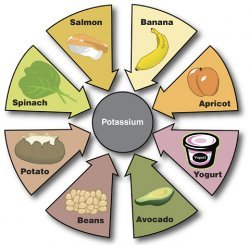Potassium is an important electrolyte that the body needs in several l hundred processes. Potassium is especially beneficial for proper muscle function. The heart is also a muscle. Therefore, the heart can not beat without potassium. However, excess potassium is detrimental to the body when the kidneys cannot clear the excess potassium. Kidney failure causes high potassium.
The body is very good at keeping potassium at adequate levels. However, there is a time such as in kidney disease, the potassium can become very high. Too much potassium in the body is dangerous.
What is Potassium?
Potassium is an electrolyte that is extremely important. Research has shown that there is a relationship between adequate potassium intake and high blood pressure.
Potassium and Health
Fifteen percent of all United States adults have chronic kidney disease. The Dietary Guidelines for Americans has concluded that potassium is a nutrient that is lacking in many Americans diet.
Potassium has been implicated in high blood pressure. Research has shown that a diet high in potassium will reduce high blood pressure.
In fact, one of the reasons why the DASH work so well to reduce high blood pressure is because the DASH diet is high in potassium.
[su_label type=”warning”]However, if you have kidney disease you should not eat a diet high in potassium.[/su_label]
When the blood pressure is lower, this also decreases your risk of stroke and coronary artery disease. Therefore, potassium is indirectly linked to the prevention of stroke and coronary artery disease.
Evidence has also been suggested that adequate potassium prevents age-related bone loss and kidney stones.
The recommends amount of potassium to be consumed daily is:
- Birth to 6 months 400 mg
- 7–12 months 700 mg
- 1–3 years 3,000 mg
- 4–8 years 3,800 mg
- 9–13 years 4,500 mg
- 14–18 years 4,700 mg
- 19–50 years 4,700
- 51+ years 4,700 mg
[su_label type=”important”]Potassium is extremely important, but too much can harm you, or even be fatal.[/su_label]
Kidney Failure and High Potassium
Kidney failure will indeed cause high potassium. Let me explain why. When a person has kidney failure, toxins are unable to clear the body completely.
Normally if the person eats or takes in too much potassium, the kidneys will expel them. Injured kidneys cannot perform this process. Therefore, people with chronic kidney disease are prone to excess potassium and other electrolytes.
The excess potassium is due to the decreased filtration of the fluid. It can also be due to decreased circulating aldosterone.
Sometimes the body in all of its wisdom will try and adapt to the excess potassium by transferring more potassium into the cells.
However, sometimes this defense mechanism is not enough, and you will experience high potassium symptoms.
What Are High Potassium Symptoms?
High potassium symptoms can very distressing. Hyperkalemia or high potassium is defined as a serum or plasma potassium level above the upper limits of normal, usually greater than 5.0 mEq/L to 5.5 mEq/L.
-
Limb paralysis
-
Nausea and vomiting
-
Muscular dysfunction
-
Cardiac dysfunction
-
Fatal heart arrhythmia
-
Muscle weakness
-
Chest pain
-
Palpitations
Clinical Problems That High Potassium Can Cause
In the Emergency Department setting, often time we will see patients who have kidney failure, or if they have skipped their required dialysis.
These individuals will usually present with nausea, vomiting, and just feeling terrible. Sometimes they will present with swelling of the legs and palpitations.
If the patient is a known dialysis patient, the patient will immediately be referred to the dialysis unit that is in the hospital. They will almost most likely be admitted to the hospital.

If the individual is not a known dialysis patient and they present with high potassium, there is always something going on with the patient that needs to be corrected.
There are several other reasons besides kidney disease that can make the patient have high potassium. These include:
- Certain medications
- Adrenal diseases
- Dehydration
- Excessive use of potassium supplements
- Type 1 Diabetes
The healthcare providers will take a complete history of the patient including their diet, their medications, and their supplements.
The provider will look for certain medications that are known to cause high potassium. Below is a list of medications that will cause high potassium levels.
What Happens When You Miss Dialysis
What happens when you miss dialysis? Missing dialysis is very dangerous. In fact, if you miss dialysis, you can die.
In the emergency room, we see this problem quite frequently. People miss dialysis for a variety of reasons from feeling ill to not having any transportation.
However, the irony is that if you don’t go to dialysis because you don’t feel good, you will start to feel much worse.
For example, if a person misses dialysis because of “cold symptoms”, the cold symptoms will be exacerbated because more toxins have built up.
However, in the section below, I will be explaining the ramifications of missing dialysis. If you have ever missed dialysis, or you are thinking of missing dialysis, you will not be missing any dialysis after reading this article.
Drugs That Cause High Potassium
| Drug | Mechanisms |
|---|---|
| Amiloride | Blocking sodium channels of luminal membrane of principal cells |
| Spironolactone | Mineralocorticoid receptor antagonist (competing with aldosterone) |
| Inhibition of adrenal aldosterone biosynthesis | |
| Cyclosporine, Tacrolimus | Inhibition of adrenal aldosterone biosynthesis |
| Induction of chloride channel shunt | |
| Increasing potassium efflux from cells | |
| Trimetoprim, Pentamidine | Blocking of sodium channels in the luminal membrane of principal cells |
| NSAIDs | Induction of hyporeninemic hypoaldosteronism through inhibiting renal prostaglandin synthesis |
| ACE inhibitors, Angiotensin-II receptor antagonists | Reduction in adrenal aldosterone biosynthesis through interrupting renin-aldosterone axis |
| Reduction in effective glomerular filtration rate | |
| Beta blockers | Inhibiting renin secretion |
| Decrease in cellular potassium uptake | |
| Calcium channels blockers (Nifedipine, Amlodipine) | Inhibition of adrenal aldosterone biosynthesis |
| Reduction in aldosterone secretion | |
| Succinylcholine | Leakage of potassium out of cells through depolarization of cell membranes |
| Digoxin | Inhibition of Na+/K+-ATPase |
| Heparin | Inhibition of adrenal aldosterone biosynthesis |
| Decreasing number and affinity of angiotensin-II receptors | |
| Mannitol | “Solvent drag phenomena” whereby potassium shifts out of cells due to the body’s attempt to maintain isotonicity while undergoing a hypertonic infusion |
What Can Cause Kidney Disease or Kidney Failure?
[su_note]When the kidneys are damaged, they can not filter accurately. Two of the biggest causes of kidney failure are high blood pressure and diabetes. High blood pressure causes kidney failure because over time high blood pressure damages the arteries and veins of the kidneys. As a result, the kidneys are unable to filter toxins and electrolytes. Diabetes causes kidney failure because the vessels of the kidney are damaged because of the increased viscosity of the blood secondary to increased sugar in the blood. [/su_note]
What Can You Do to Protect Your Kidneys?
The kidneys can take a lot of insult and punishment. In fact, I have seen patients have to go on dialysis for a few weeks, and then the kidneys come back completely.
Taking your blood pressure is one of the most important things you can do to protect your kidneys. The Omron blood pressure monitors are excellent for monitoring your blood pressure whether it is every day, weekly, or monthly.
[su_button url=”https://track.flexlinkspro.com/a.ashx?foid=1132399.1747865&foc=2&fot=9999&fos=1″ target=”blank” style=”flat”]Click Here to Find Out More Info About Blood Pressure Monitors[/su_button]
Also if you have diabetes, it is extremely important to monitor your blood sugar. If you are taking insulin, you should be taking your blood sugar daily. There are a plethora of glucometers available.
[su_button url=”https://amzn.to/2Cw5xdx” target=”blank” style=”flat” radius=”0″]Click Here For More Info On Glucometers[/su_button]
Maintaining your weight and exercising are interventions that you can do to keep your kidneys healthy.
Foods to Avoid With Kidney Disease
These foods should be avoided in excess unless you are under the strict orders of a doctor:
- Cantaloupe and honeydew
- Bananas
- Potatoes
- Spinach
- Oranges and Orange Juice
[su_box title=”Conclusion” box_color=”#4a68e9″]If you have chronic kidney disease or if you are on dialysis, you should be very careful with your potassium intake.[/su_box]






